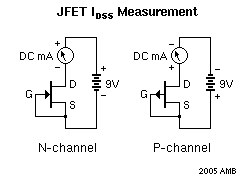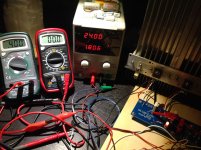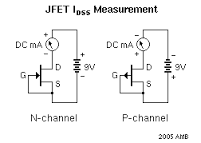all mosfets are having same dissipation....be sure that they're all torqued the same
@ Zen Mod
Yeah ! Thx Mighty
Was not torqued with the same preassure now is equlibrium.
@ WalterW
Thanks for kind words it´s encourage me to make great amplifier.
Humbe test so i made with i have on table without drill heat sink.
Yes mosfets be claped at final step of construction
and little thermal paste drop bettwen jfets too with heatsrink ring
to keep them togheter.
Last two days check of bias @ offset with long music sessions
Power on and after 5~ 10 minutes all is perfect.
Excellent sound J is acronym of Aleph Jazz i guess
voice ,piano , trumpet ,contrabass and drum all flows naturaly.
https://www.youtube.com/watch?v=1T9Q7FBve_U
You are right Walter F5 , F4 are ready waits as well to be tested and CSX1
be stuffed next weekend , probably i try other solder with silver and cooper.
Solder, lead-free Reel Stannol Sn95Ag4Cu1 100 g 1.0 mm from Conrad.com
@ Folkdeat95
Yes for optimal max bias adjustement low distortion without temperature excess
industrial probe are must have but not critical for first day do you
make music in auditorium ?
I love this electronic amateur hobby 😀
Work in progress
Greetings
Attachments
Last edited:
I didn't know you were working on a Aleph J.... 😀
Hi WalterW
Your AlephJ have ben modified at Q3, R13, R14
could you tell me what the reason or benefits ?
Thanks for response
Best regards 🙂
Hi Soundhappy
Q3, R13 and R14, I did not mount on the PCB, it is the current-limiter for when you accidentally short the outputs.
I have read somewhere that it sounds better without the current-limiter, but don't know if that's true....
Q3, R13 and R14, I did not mount on the PCB, it is the current-limiter for when you accidentally short the outputs.
I have read somewhere that it sounds better without the current-limiter, but don't know if that's true....
Hi WalterW
My Aleph J is connected directly to full range & without filter.
After reads of many articles i try wirewound resistors and coupled with little oil caps
one thing at one test and with the same music and gain.
In conclusion sonic signature with more or less subtle changes
can be adjusted to each personal taste.
Anyway good panasonic R and vishay dale sound realy good as well.
Thanks for explanations Walter i try this mods 🙂
My Aleph J is connected directly to full range & without filter.
After reads of many articles i try wirewound resistors and coupled with little oil caps
one thing at one test and with the same music and gain.
In conclusion sonic signature with more or less subtle changes
can be adjusted to each personal taste.
Anyway good panasonic R and vishay dale sound realy good as well.
Thanks for explanations Walter i try this mods 🙂
Could you re-post the old link?
Hi Jim, could you post the old link about transistor matching...seems to be broken now.
TIA
John
Yes, you need a 9V battery and some alligator clips -

If you bought 'C' you will want the lowest Idss you can pair, in that range. It should work great.
Hi Jim, could you post the old link about transistor matching...seems to be broken now.
TIA
John
Thanks for that Jim!
I have some coming from Spencer, (4) 2sJ74. I also have (16) LSJ74 from DIY store.
If I'm not mistaken, then, the object will be to find (2) that match for one Aleph J board, and another (2) match for the other AJ board. I understand that a "quad" match, although desirable, is not necessary in this case.
Another question is this: may I combine the Toshibas with the Linear systems? e.g. could I find two matched pair (either brand) for one AJ board, and then another matched pair for the other AJ? Or in another case, might I use two of the closest Toshibas on one board, and two of the closest Linears on the other AJ?
Thanks again for your usual great support,
John
It might be Jim, I never saw the old link, but surely this looks to be a good simple idss matching tool.This illustration?
I have some coming from Spencer, (4) 2sJ74. I also have (16) LSJ74 from DIY store.
If I'm not mistaken, then, the object will be to find (2) that match for one Aleph J board, and another (2) match for the other AJ board. I understand that a "quad" match, although desirable, is not necessary in this case.
Another question is this: may I combine the Toshibas with the Linear systems? e.g. could I find two matched pair (either brand) for one AJ board, and then another matched pair for the other AJ? Or in another case, might I use two of the closest Toshibas on one board, and two of the closest Linears on the other AJ?
Thanks again for your usual great support,
John
You need to make a pair of J74 with the same (or close as possible) Idss.
You then need to do the same for the other channel. The chances of getting a quad from 16 peices is close to zero. It's also not necessary at all, as the Jfet are not operated in self-bias, but are going to run at the current set by the CCS. I.E., one amp could have a pair at 6.0mA, the other at 11.0mA, and it operate completely the same.
So all you need is (2) pairs, each with similar idss to it's mate, so that the current is shared equally.
If you want Toshiba in one amp and LS in the other, go ahead, I can't determine a bit of difference between the two.
You then need to do the same for the other channel. The chances of getting a quad from 16 peices is close to zero. It's also not necessary at all, as the Jfet are not operated in self-bias, but are going to run at the current set by the CCS. I.E., one amp could have a pair at 6.0mA, the other at 11.0mA, and it operate completely the same.
So all you need is (2) pairs, each with similar idss to it's mate, so that the current is shared equally.
If you want Toshiba in one amp and LS in the other, go ahead, I can't determine a bit of difference between the two.
hi guys, can you help me fix a hum problem?
i've got the following setup: aleph J as amp with the universal psu v3, mez b1 as a pre-amp.
All pretty much with standard BOM equipment.
i'v made some photo's for you guys to investigate, they are on my onedrive account (hope thats not to much of a problem)
http://1drv.ms/1LK79gs
So what happens, i tun on the amp and there is a noticable hum on both speakers, when i turn the amp of there is a thump and then silence.
a second thing is that when turning of the amp the + voltage led of the psu is burning for about 5 minutes but the - voltage led is down immediately. this doesnt happen when i disconnect the aleph j pcb's, then both leds are burning for about 5 minutes after the amp is put off.
What did i do to investigate:
1- To outrule my diy DDDAC1794, i disconnected it, after that the hum is still there.
2- To outrule the Mez b1 pre-amp i put the volume to the highest to hear if the hum is getting louder but this doesnt happen.
3- I checked if i soldered the wires of the inputs to the pre-amp, from the pre-amp to the Aleph J and from the Aleph J to the speakers
in the right order and place, this happens to be so.
what should i check next?
thanks in advance
Dehaai
i've got the following setup: aleph J as amp with the universal psu v3, mez b1 as a pre-amp.
All pretty much with standard BOM equipment.
i'v made some photo's for you guys to investigate, they are on my onedrive account (hope thats not to much of a problem)
http://1drv.ms/1LK79gs
So what happens, i tun on the amp and there is a noticable hum on both speakers, when i turn the amp of there is a thump and then silence.
a second thing is that when turning of the amp the + voltage led of the psu is burning for about 5 minutes but the - voltage led is down immediately. this doesnt happen when i disconnect the aleph j pcb's, then both leds are burning for about 5 minutes after the amp is put off.
What did i do to investigate:
1- To outrule my diy DDDAC1794, i disconnected it, after that the hum is still there.
2- To outrule the Mez b1 pre-amp i put the volume to the highest to hear if the hum is getting louder but this doesnt happen.
3- I checked if i soldered the wires of the inputs to the pre-amp, from the pre-amp to the Aleph J and from the Aleph J to the speakers
in the right order and place, this happens to be so.
what should i check next?
thanks in advance
Dehaai
- with nothing on amp inputs , is there silence ?
- with inputs grounded , is there silence ?
- with inputs grounded , is there silence ?
Hi Zen Mod,
on youre first question, not at all, in fact there is more hum.
on you second question, how shoul i ground these?
on youre first question, not at all, in fact there is more hum.
on you second question, how shoul i ground these?
short between hot and gnd on RCA
give us pictures of inputs - are you using both XLR and RCA and how you arrange that ?
give us pictures of inputs - are you using both XLR and RCA and how you arrange that ?
From my personal experience of building various Pass amps, Aleph J is very demanding on the power supply caps. Unless they have very good ripple current capabilities, the amp will hum. I see from your pictures, you have used Nichicon 15000 uF, 25V caps, which to my mind will be less than 5 amps per cap ripple current capabilities. I have used Panasonic and CDE caps, which have over 6-7 amps ripple current capability and didn't have problems after that.hi guys, can you help me fix a hum problem?
i've got the following setup: aleph J as amp with the universal psu v3, mez b1 as a pre-amp.
All pretty much with standard BOM equipment.
i'v made some photo's for you guys to investigate, they are on my onedrive account (hope thats not to much of a problem)
http://1drv.ms/1LK79gs
So what happens, i tun on the amp and there is a noticable hum on both speakers, when i turn the amp of there is a thump and then silence.
a second thing is that when turning of the amp the + voltage led of the psu is burning for about 5 minutes but the - voltage led is down immediately. this doesnt happen when i disconnect the aleph j pcb's, then both leds are burning for about 5 minutes after the amp is put off.
What did i do to investigate:
1- To outrule my diy DDDAC1794, i disconnected it, after that the hum is still there.
2- To outrule the Mez b1 pre-amp i put the volume to the highest to hear if the hum is getting louder but this doesnt happen.
3- I checked if i soldered the wires of the inputs to the pre-amp, from the pre-amp to the Aleph J and from the Aleph J to the speakers
in the right order and place, this happens to be so.
what should i check next?
thanks in advance
Dehaai
My 2 cents.
Cheers
@Zen Mod, I've uploaded 2 pictures, one of the inputs the other is a photo of the mez b1.
I shorted the hot and ground of the rca input, the hum was still there.
I only use RCA inputs, twisted pairs to every rca
link the the photo album: http://1drv.ms/1LK79gs
@anilva, thanks for the intel, will keep that in mind, which Panasonic did you use?
I shorted the hot and ground of the rca input, the hum was still there.
I only use RCA inputs, twisted pairs to every rca
link the the photo album: http://1drv.ms/1LK79gs
@anilva, thanks for the intel, will keep that in mind, which Panasonic did you use?
Last edited:
when i turn the amp of there is a thump and then silence.
a second thing is that when turning of the amp the + voltage led of the psu is burning for about 5 minutes but the - voltage led is down immediately.
That's normal behavior, mine AJ does that too.... that's what's causing the thump.
@WalterW, thanks for your input, clarefies one mysterie for me 🙂
btw, can this be resolved in any way?
btw, can this be resolved in any way?
@Zen Mod, I've uploaded 2 pictures, one of the inputs the other is a photo of the mez b1.
I shorted the hot and ground of the rca input, the hum was still there.
I only use RCA inputs, twisted pairs to every rca
link the the photo album: http://1drv.ms/1LK79gs
@anilva, thanks for the intel, will keep that in mind, which Panasonic did you use?
if hum is same in both channels , then disconnect rail wires to one channel and observe what's happening
if hum vanish , you need more muscles in cap bank
but - before that , try to gnd inputs ditto on amp pcbs , to exclude all that inputs wire harness ;
if hum is still there , proceed with PSU test
if hum is same in both channels , then disconnect rail wires to one channel and observe what's happening
if hum vanish , you need more muscles in cap bank
but - before that , try to gnd inputs ditto on amp pcbs , to exclude all that inputs wire harness ;
if hum is still there , proceed with PSU test
I tied the input of the amp to the ground but then all the sound died, also the hum. for youre information there is also a wire between the grd and the -in.
did the psu test also (against youre advice i did this test first, because this was easy and quick to go trough), the psu test did not delete the hum.
then you need to sort that mess you made with input selector wires , especially with pot wiring
route everything as short as possible , twist pairs , use coax if needed ........
take a look at numerous pictures of finished projects , and think about details
that way you'll learn .....
route everything as short as possible , twist pairs , use coax if needed ........
take a look at numerous pictures of finished projects , and think about details
that way you'll learn .....
An externally hosted image should be here but it was not working when we last tested it.
- Home
- Amplifiers
- Pass Labs
- Aleph J illustrated build guide


